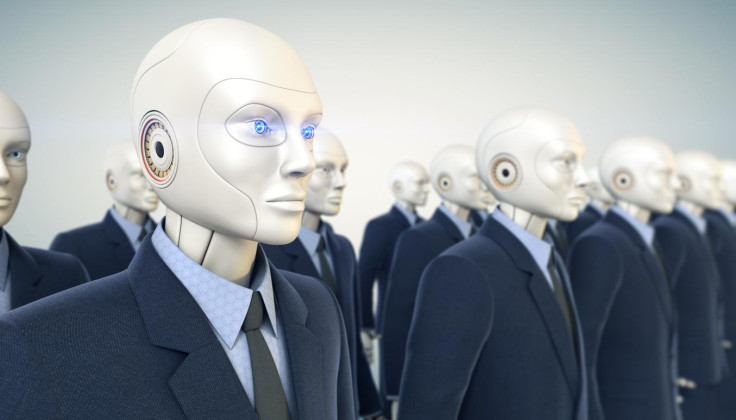Robots will take our jobs – but that's good for the future of civilisation
Fear of unemployment as a result of mechanisation is not new. Our ancestors feared automation, too.

The next time you're standing at a busy junction, look around and count how many people you can see driving for a living. Tot them up – bus drivers, van drivers, Amazon deliverymen, Ubers, black cabs, hauliers – and you're looking at the single biggest sector of our economy. Yet, in another decade or so, almost all these men – they're mainly men – will be out of work, displaced by driverless cars and delivery drones.
And not just drivers: journalists, accountants, librarians, estate agents – all are at risk from advances in technology. According to Mark Carney, the Governor of the Bank of England, fifteen million jobs will be lost as a result of such innovation.
Fifteen million jobs: that's nearly half the workforce. So are we facing an era of mass unemployment? Au contraire, as we Old Brussels Hands say. Ten years from now, we'll almost all be better off – not least the former drivers.
Fear of unemployment as a result of mechanisation is not new. Precisely the same anxiety was voiced when our ancestors learned how to get more yield from farmland. In 1750, around 80 per cent of Britons worked in agriculture – a figure that had not altered much since classical times. By 1840, that proportion had fallen to 22 per cent. Today it stands at 1.2 per cent.
Through the late eighteenth and early nineteenth centuries, powerful voices – led by The Times – argued that modern agrarian techniques would wreck lives. The new factories would never be able to absorb all those jobless farmworkers. The "real" jobs – everyone knew this – were on the land.
In the event, people released from backbreaking toil in the fields began to produce things which the masses had not previously been able to buy: cutlery, porcelain, rugs, mirrors, clocks, machine-made clothes in new fabrics. Living standards took off. Britain's population, which had fluctuated only slightly since the Roman occupation, more than tripled in the century after 1750.
There are some lessons that the human brain is not designed to process. When Britain moved from industry to services in the twentieth century, precisely the same dire prophecies were intoned. The "real" jobs – everyone knew this – were in manufacturing. There simply wouldn't be enough work to go round in hairdressing and burger-flipping (two lines of work which, for some reason, always excite the peculiar scorn of metro-snobs).
In the twentieth century, as in the eighteenth, the time and energy freed up by technological advance was deployed elsewhere. People found that they could afford basic commodities, such as food and clothing, while working shorter hours. They used their spare time to generate wealth in ways their grandparents couldn't have imagined. The country got richer.
Not everyone was a winner. When telephones became widespread telegraph operators lost their jobs. Telling those telegraphists that, overall, the gains outweighed the losses, would have been scant consolation. The gains, though vast, were dispersed; the losses, though small, were concentrated. And so it was with the shutting down, in the 1970s and 1980s, of coalmines and steel mills.
My constituency, which covers the Home Counties, never had much by way of heavy industry. The main exception was Chatham Dockyard which, at its height, employed more than 10,000 people. Not everyone bounced back from its closure in 1984. A 50-year-old welder who had only ever worked in that shipyard had few transferable skills. The disappearance of his job was likely to mean a loss of dignity as well as income. To this day, the closure is resented – and generally blamed on Margaret Thatcher.
Hardly anyone tells the story to its end, though. There are now as many people working in the area of the shipyard as ever, some of them at Medway University, others in the audiovisual sector – it's where the BBC drama Call the Midwife is filmed, for example. Local unemployment is below two per cent.
My own grandfather was a shipyard worker on the Clyde. I never knew him: it was a hard life, and he died before I was born. So I never got the chance to ask him whether he would have wanted his industry to be kept going so that his grandsons could earn a living by hammering metal rather than tapping at keyboards. I doubt, though, that he would have wished his life on us.
To understand why the displacement of old technologies creates more jobs, we need to grasp the distinction drawn by the nineteenth century French economist Frédéric Bastiat between the seen and the unseen. An unemployed telegraphist is seen; the immense productivity gains made by the companies that can now use telephones is unseen. But the money that previously went on the old technology can now be put to use expanding other industries or creating new ones.
Similarly, the productivity gains brought in by driverless cars will create more than enough economic activity to provide new jobs for former drivers.
What new jobs? If I knew that in advance, I'd be a billionaire. But someone out there knows. Indeed, someone is already working on the prototype. Just as the rest of us didn't see smartphones or cheap airlines coming, so we generally can't see the next big life-changing innovation. But it will come.
That last paragraph could have been written at any point in the last 200 years. It would always have prompted snorts of disbelief. It would always have been true.
Daniel Hannan has been Conservative MEP for the South East of England since 1999, and is Secretary-General of the Alliance of European Conservatives and Reformists
© Copyright IBTimes 2025. All rights reserved.






















